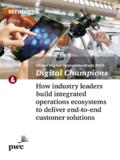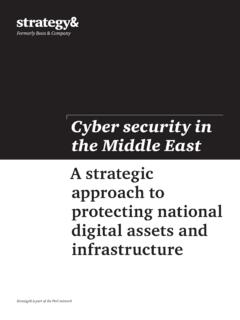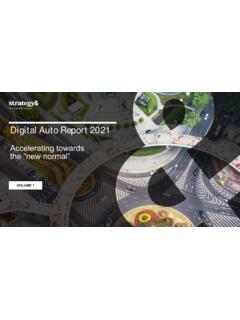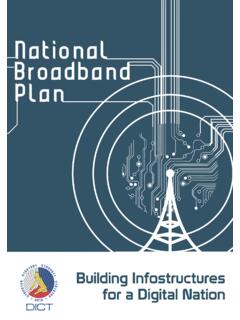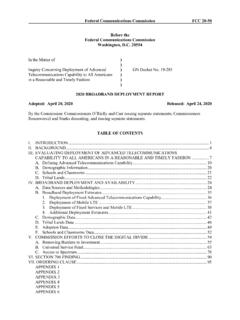Transcription of Maximizing the impact of digitization
1 Maximizing the impact of digitizationStrategy& is part of the PwC network2 Strategy&AmsterdamSteven PattheeuwsSenior Executive Advisor+31-6-22691964 El-Darwiche Partner +961-1-985-655 Acker Partner+971-4-390-0260 Tusa Partner+971-4-390-0583 Singh Principal+971-4-390-0260 sseldorf Roman Friedrich Partner +49-211-3890-165 Kirvel Partner +358-9-6154-6666 Kenny Kurtzman Senior Partner +1-713-650-4100 Jose Arias Partner +34-91-411-5121 CityCarlos Navarro Partner +52-55-9178-4209 Pugliese Partner +39-02-72-50-93-03 DelhiAshish Sharma International Director +91-124-499-8700 YorkChristopher Vollmer Partner+ Pierre P ladeau Partner +33-1-44-34-3074 Halaoui Partner +966-1-985-655 o Paulo Ivan de Souza Senior Partner +55-11-5501-6368 Toshiya ImaiPartner+ Vienna Klaus H lbling Partner +43-1-518-22-907 KosterPartner+ the authorsKarim Sabbagh was formerly a senior partner with Booz & Company.
2 Bahjat El-Darwiche is a partner with Strategy& in Beirut. He specializes in communications, media, and technology and has led engagements in the areas of telecom-sector liberalization and growth strategy development, policymaking and regulatory management, business development and strategic investments, corporate and business planning, and privatization and Friedrich is a Strategy& partner based in D sseldorf and Stockholm. He leads the firm s communications, media, and technology practice in Europe, and specializes in the strategic transformation of fixed-line and mobile communications, technology-based transformation, and sales and marketing in the communications, media, and technology Singh is a principal with Strategy& in Dubai.
3 He specializes in sector policy and development strategy for the telecommunica tions Katz and Sandeep Ganediwalla also contributed to this published in The Global Information Technology Report 2012: Living in a Hyperconnected World, World economic Forum, 2012, and by Booz & Company in today face a different environment for information and communications technology (ICT) than the one for which they designed policies. ICT technologies are far more pervasive than they were previously: More people today have access to a mobile phone than to electricity, powering exponential growth in global data With ICT access approaching ubiquity, policymakers next challenge is to ensure that individuals, businesses, and governments are making the best possible use of networks and applications.
4 Countries that have achieved advanced levels of digitization the mass adoption of connected digital technologies and applications by consumers, enterprises, and governments have realized significant benefits in their economies, their societies, and the functioning of their public attempts to measure the impact of ICT have focused primarily on assessing the economic effects of widespread access to either wireless or broadband technologies. But in developing a comprehensive methodology to measure the impact of digitization , Strategy& found greater benefits linked to growing usage of digital technologies and applications, rather than access alone.
5 We also found that benefits are not just economic , but encompass social and political spheres as well. digitization offers incremental economic growth: countries at the most advanced stage of digitization derive 20 percent more in economic benefits than those at the initial stage. digitization has a proven impact on reducing unemployment, improving quality of life, and boosting citizens access to public services. Finally, digitization allows governments to operate with greater transparency and have an important role to play in ensuring that their countries are progressing toward advanced stages of digitization . They need to acknowledge where they currently stand and recognize the benefits of digitization .
6 Finally, they need to shift focus away from access and set into motion programs and plans that focus on the widespread adoption and usage of technology. That includes elevating digitization on the national agenda, including the systematic planning and tracking of their efforts; evolving sector governance structure; adopting an ecosystem perspective; enabling competition; and stimulating summary5 Strategy& The world is witnessing an accelerated pace in digitization the mass adoption of smart and connected ICT by consumers, businesses, and governments. Measuring digitization and its impact is essential for supporting policymaking and investment decisions.
7 Proposed econometric methodology quantifies the impact on economic advancement, societal well-being, and government effectiveness. digitization multiplies the benefits of connectivity, as it generates three times more economic benefit than broadband alone. digitization contributes positively to job creation, with a 10 percent increase in digitization reducing the unemployment rate by percent. Countries in the advanced digitization stage reap 20 percent more economic benefits than countries at the start of their digitization journeys. Policymakers need to acknowledge where their countries currently stand and set into motion programs and plans that focus on the widespread adoption and usage of digitization .
8 That includes elevating digitization on the national agenda, evolving sector governance, adopting an ecosystem perspective, enabling sustainable competition, and stimulating highlights6 Strategy& digitization : ICT s next evolutionThe proliferation of digital technologies over the past two decades has been substantial, marking one of history s most rapid rates of adoption of new technologies. The number of personal computers (PCs) in use worldwide surged from 100 million in 1990 to billion by 2010. There were 10 million mobile phone users in the world in 1990; today there are more than 5 The number of Internet users grew at an even more rapid rate over the same decades, from 3 million to 2 To put that into context, only two decades ago there were as many Internet users in the world as people in the city of Madrid; today, there are as many people online as are living in all of Asia.
9 The surge in ICT use has not been restricted to the developed world. In Africa, for example, more than half a billion people today connect to mobile The explosive growth of ICT services is presenting policymakers with three key challenges. The first challenge is to establish standard performance indicators to measure the extent to which ICT is being assimilated in societies. During most of the sector s development, ICT stakeholders focused primarily on access, building the networks that today connect much of the planet; they devised metrics accordingly. In a world of near ubiquity in terms of access, policymakers need a new way to look at the ICT second challenge concerns the lack of tools to determine the impact that the mass adoption of connected digital technologies and applications is having on societies and economies.
10 With practical, reliable tools to measure the benefits of digitization , governments could potentially be more ambitious in developing and investing in the ICT third challenge is for policymakers to adopt new policy tools to accelerate digitization and reap its accompanying benefits . Over the past two decades, policymakers established rules to enhance access to communication services setting policies that introduce competition and promote infrastructure sharing, for example. Now they need to gain a similar understanding of the ways in which they can encourage adoption and boost the usage of digital applications by consumers, businesses, and public technologies and applications contribute to the eco nomic strength, societal well-being, and effective governance of a and measuring digitizationWe believe the extent of a country s digitization can be measured across six key attributes.

